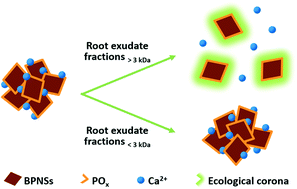Species-dependent eco-corona dictates the aggregation of black phosphorus nanosheets: the role of protein and calcium†
Abstract
There are numerous application prospects for black phosphorus (BP) in biomedical and agricultural fields. Here, the dispersion stability of BP nanosheets (BPNSs) in the root zone, which is essential for its bioactivity in plants, was investigated using the root exudates of rice, pumpkin, and soybean with the presence of a common environmental ion (Ca2+). The results showed that those root exudates inhibited the aggregation of BPNSs. The critical coagulation concentrations (CCCs) of Ca2+ for BPNSs dispersed in solutions with root exudates of rice and pumpkin increased over 97 times higher than that without exudates. Soybean exudates exhibited the strongest aggregation inhibition effects, as the aggregation behavior of BPNSs was maintained in the reaction-limited regime in the tested Ca2+ concentration range (1.28 × 104–9.62 × 104 mg L−1). Exudate macromolecules were able to directly stabilize the BPNSs. The CCC values for exudate fractions >3 kDa (molecular weight >3 kDa) were over 129 times higher than that without exudates. It was proven that exudate protein was adsorbed onto the BPNSs, as promoted by Ca2+, and formed protein corona, which suppressed the attachment of BPNSs and conjunction with Ca2+ for particle growth. This study explored the inhibitory effect of ecological corona (eco-corona) on the aggregation of BPNSs in the crop root zone, and provides a crucial foundation for future studies on BP nanoparticles' interactions with organisms and potential sustainable agricultural applications. It is proposed that root exudates are an essential constituent of eco-corona, which require more attention in ultimate fate evaluation of nanoparticles.

- This article is part of the themed collection: Environmental Science: Nano Recent HOT Articles


 Please wait while we load your content...
Please wait while we load your content...